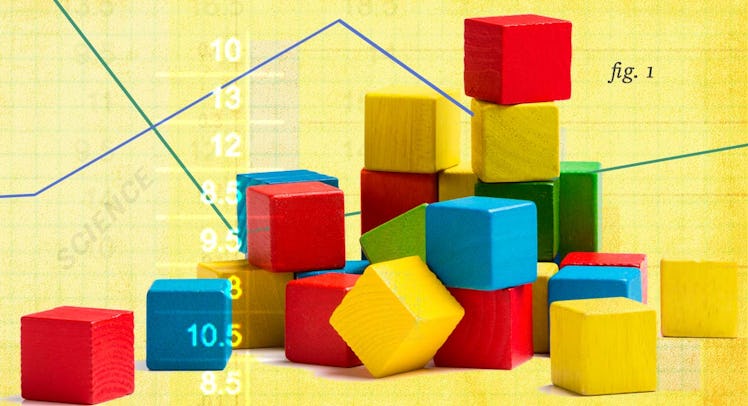Scientists Say Skip The STEM Toys And Buy Wooden Blocks Instead
Across eight years of study, researchers have found that both boys and girls display the most engaged play when handling simple, wooden blocks.

You can’t buy a smarter kid. Whether it’s expensive private tutors or a closet full of STEM Toys, researchers agree that there’s no particular purchase that’ll guarantee your kids a free ride to college.
But some toys are doubtless better than others at priming preschoolers for long-term academic achievement. For instance, across eight years of study researchers have consistently found that both boys and girls display the most engaged play when handling simple, wooden blocks. Blocks promote “a terrific amount of problem-solving …and also mathematical thinking,” co-author Jeffrey Trawick-Smith of the Center for Early Childhood Education, told The New Yorker in 2013.
Open-ended toys promote the highest quality play, studies suggest, and kids who play with such toys may be more likely to pursue math and science as adults. That’s one reason why parents should be buying construction-based toys like blocks or Tinker Toys for their kids. And one very good reason why more dads need to start thinking of their daughters, too, during Lego shopping sprees.
Here’s a breakdown of the numbers behind these conclusions:
Children Are Most Engaged By Simple, Open-Ended Toys
Trawick-Smith is a principal investigator on the TIMPANI study, an annual research effort that examines the effects of specific toys on the play of three- and four-year-old children. To test each product, Trawick-Smith and colleagues record hours of video during playtime in diverse preschool classrooms, and then assign each toy a numeric PQT (Play Quality with Toys) score. The score considers whether children demonstrate learning behaviors when engaging with the toy. Do they problem-solve with it, ask questions about its properties, or show sustained interest in it? The data below illustrate their 2015 findings. Duplo bricks scored the highest, because they are non-realistic items (open-ended) that can be sorted or stacked like construction toys.
Preschoolers Who Play With Blocks Perform Better In High School
Although there’s scant evidence that dedicated STEM toys give children an academic edge, play with simple, wooden blocks appears to be correlated with achievement in the classroom. The data below derive from a 2001 study, which followed 37 preschoolers from 1982 until they graduated high school in 1998. Preschoolers who scored high on a “block performance measure” (indicating that they displayed high-quality play with wooden blocks) performed slightly better on standardized tests and obtained slightly higher teacher-awarded grades than their peers.
The data points are correlation coefficients — a way of measuring how well two variables (high-quality block play and test scores) correlate to one another. It is noteworthy that some of these figures, such as the negative seventh-grade score, were not statistically significant. Nonetheless, the authors concluded that “there is a statistical relationship between early block performance during preschool and achievement in mathematics…at the later middle and high school levels.”
Gender Bias In STEM Toys
If construction-based toys promote higher quality play and later achievement in math, one would hope that these toys would be available to both boys and girls. But the data below, presented at the American Society for Engineering Education in 2015, suggest that parents largely purchase math, science, and construction-based toys for their sons (presumably leaving their daughters with eminently unstackable Barbie dolls). The authors say their results — collected in part from Amazon.com purchase data — may explain the underrepresentation of women in STEM fields.
“Recent research indicates not institutional factors but resource availability as the primary source of workplace discrimination against women in technical fields,” the authors write. “Among these resources is the development of science and math skills in early childhood, an ability that is often developed through the use of science- or math-geared toys at an early age.”
This article was originally published on